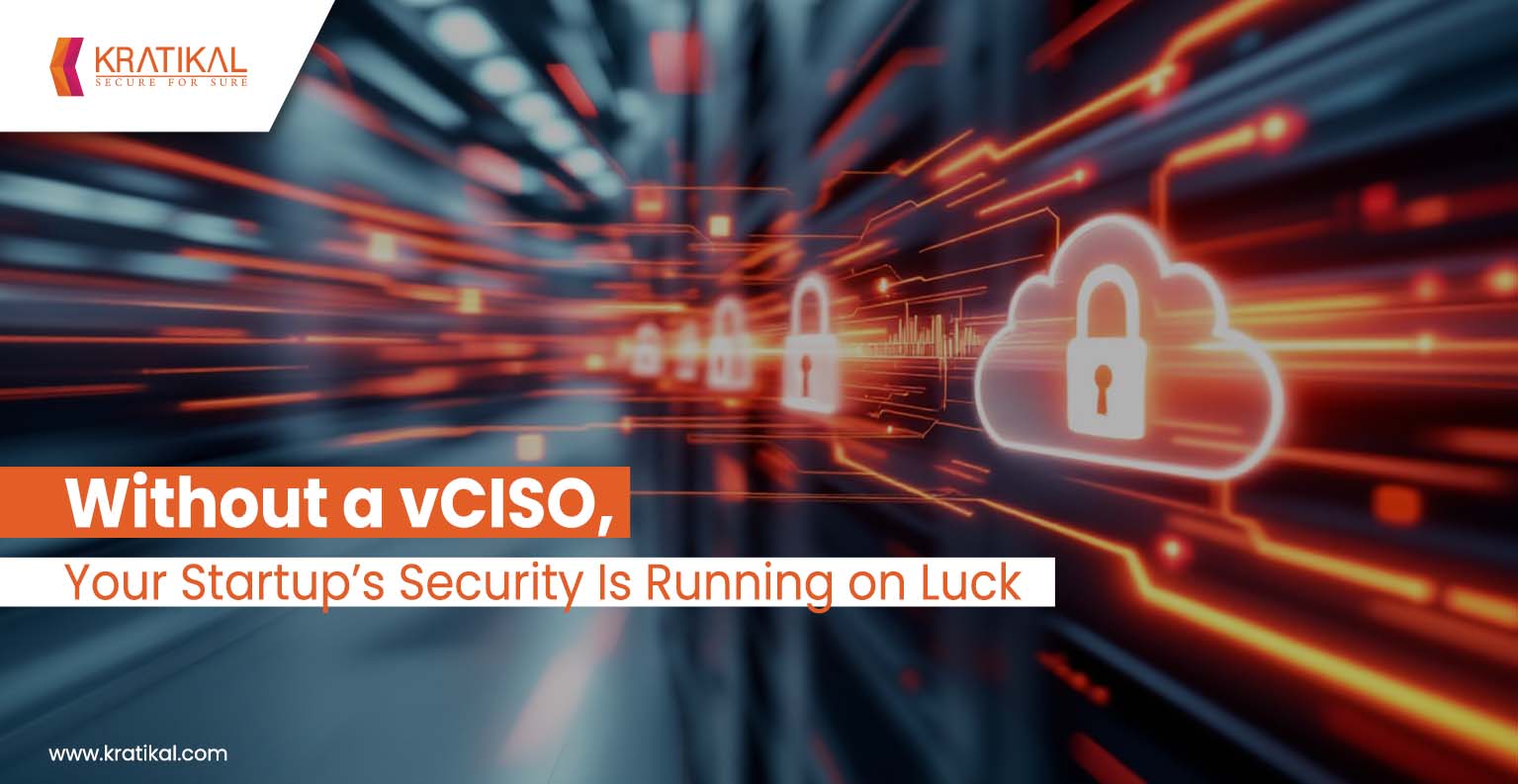What do you think is the startup illusion of safety? If there is any? Baby organizations tend to believe “we’re small, we’re agile, risk is low” when it comes to cybersecurity. That belief might not have been dangerous a few years back, but it definitely is now. The harsh reality is: size doesn’t grant immunity anymore. Without leadership in security that is strategic, your startup isn’t just vulnerable; it’s running on luck. Given our strong cybersecurity defenses available, a specialised role like a virtual Chief Information Security Officer (vCISO) fills that leadership gap. Without it, every decision is either ad hoc, reactive, or missing strategic alignment with business growth. In a battleground where our enemies are tough, critical segments require the governance of someone who is a wizard in that domain. Let’s walk through in detail why this matters.
Table of Contents
- 1 Book Your Free Cybersecurity Consultation Today!
- 2 Get in!
Why vCISO – Threats are Real and Costs are High!
You need to grasp the scale of the risk before you shrug off “we’ll deal with security later.” Here are a few statistics that testify to the statement:
- According to the IBM Cost of a Data Breach Report 2025, the global average cost of a data breach is USD 4.44 million.
- For small firms and startups: one UK publication cites the average cost per cyber incident for a small business in 2025 at USD 164,000.
- About 43% of all cyber-attacks target small businesses, according to one data set.
- 61% of small businesses reported being targeted in the past 12 months.
- 95% of cybersecurity incidents at SMBs cost between USD 826 and USD 653,587.
What this tells us: If you’re a startup with perhaps 100 – 2000 employees, you’re definitely within that risk band. As we mentioned earlier, a breach doesn’t mean “big enterprise only.”
And the costs? They’re not just “we’ll fix the server” costs. They include customer loss, reputation damage, compliance penalties, downtime, and potentially the failure of your business. One research confirms that 60% of small companies close within six months of a cyberattack.
Book Your Free Cybersecurity Consultation Today!
Why Having a vCISO is Not a Mere Discussion, but an Important Agenda?
Let’s get concrete here! What is a vCISO, and what do they bring that a “we’ll just do basic IT security” mindset doesn’t?
- A vCISO is a seasoned security leader engaged on a part-time, outsourced, or fractional basis. They provide leadership, strategy, risk management, and compliance guidance.
- They are cost-effective. For startups, hiring a full-time CISO with salary, benefits, and overhead may be unrealistic. Having a vCISO cuts out the barrier.
- They align security with business strategy. A startup’s top priorities are growth, product launch, and most importantly, customer acquisition. This is why you need security that doesn’t become a bottleneck. A vCISO helps integrate security with your business, and not as an afterthought.
- They provide proactive risk management, governance, compliance readiness which startups often ignore until it’s too late. Kratikal for Startups initiative is devoted to the same purpose.
Summarizing, the gap isn’t just “does IT have antivirus?” It’s “who is thinking about risk, aligning security to growth, readying us for an incident, impressing investors or customers on security?” Without someone doing that, even part-time, you’re leaving strategy on the table.
What Happens When You Don’t Have vCISO?
Let’s directly dive into specifics. Here are the failure modes of skipping this role, and yes, they apply to startups just as much as big firms, often more because you’re less prepared.
Reactive security instead of planned security
You’ll patch when you have to, respond when something happens, rather than anticipate. Employee training gets skipped, vendor risk is overlooked, and incident plans are sketchy. That costs more and takes longer.
Misaligned security with business goals
If your focus is “we must ship feature X” and security is “we must lock everything down”, you end up either blocking growth or being insecure. A vCISO mediates that tension. Without one, you’ll either cripple swiftness or compromise safety.
Compliance and trust deficits
Investors, enterprise customers, and partners ask: “What’s your security posture?” No vCISO means weaker answer and that leads to lost deals. Startups that can’t prove security may lose credibility or miss partnerships.
Greater cost and downtime when breach happens
Without leadership, you’re slower to detect, slower to respond. The IBM report indicated an average lifecycle of breach at 241 days in 2025. The longer it stays undetected, the higher the cost.
It’s not just breach cost. It’s customer churn. Reports say that 45% of attacked small businesses report customer loss). It’s brand damage. It’s internal distraction. A startup should be innovating, not firefighting.
You Need a vCISO – What’s the Startup Urgency
Your startups aren’t big enterprises and that means two things:
- less margin for error
- more incentives to attack.
Many startups misassume “we’re too small to be targeted”. That’s false as attackers go after weak targets. Growth inherently means more complexity: cloud, SaaS, third-party vendors, BYOD, devops pipelines. All of them are attack surface vendors. Investors increasingly ask for a security posture. You not being ready may block funding or acquisition. Last but not least, speed always matters! A breach early on can derail trust before your brand is established, which is tougher to recover from than a larger company.
Therefore, because of this, your startup’s security posture needs to be embedded early and never postponed. A vCISO is all about how you do that without derailing the budget.
Won’t Hiring an Internal CISO Do the Job?
It will definitely do the job. But, as a startup with limited financial power, it’s better to opt for vCISO. Here are the justifications:
- A full-time CISO’s salary in many markets is USD 250k – 350k plus benefits and overhead. That may not make sense when you’re scaling lean.
- Hiring someone full-time takes a lot of time and effort. The workload would not demand the time of a full-time CISO.
- A vCISO gives flexibility. You can scale up/down as you grow, and access diverse experiences as they often support multiple clients.
- For early-stage startups that don’t yet have a full-blown security team, vCISO is smarter, faster, leaner.
What You Should Expect from a vCISO?
If you decide to go this route, don’t just hire and forget. Here’s what you should demand:
- Risk assessment: What are your biggest exposures, like product, data, people, vendor?
- Strategic roadmap: What needs to be done now vs next 12 months vs longer term?
- Incident response planning: If something happens, who does what? What’s the playbook?
- Compliance gauge: Are you ready for SOC 2/ISO/whatever your investors/customers ask?
- Employee training and culture change: Security isn’t just technology; people are often the weakest link, and human error is involved in 68% of breaches.
- Vendor/third-party risk management: Many breaches come via weak links.
- Metrics and reporting: You want a dashboard that shows “we’re improving”, not just “we did something”.
- Business alignment: The vCISO should speak your language like growth, product, ROI, not just “we need more firewalls”.
As a Takeaway – Real-world Numbers to Drive it Home
- Startups and SMBs: An incident cost between USD 120,000 and USD 1.2 million.
- Only 28% of small firms have a full-time cybersecurity expert or team in 2025.
- 50% of small businesses take 24 hours or more to recover from a breach.
- Global cybercrime cost is projected at USD 10.5 trillion annually by 2025.
Get in!
Join our weekly newsletter and stay updated
This means: you are literally playing with high stakes. It’s time for you to start leading right. Here’s the blunt reality: If you don’t have someone, even part-time, owning a security strategy, aligning it with your startup growth, you’re relying on luck. And in cybersecurity, luck is a terrible plan. It’s your call: Will you treat security as a checkbox or as a strategic enabler? Because without a vCISO or equivalent role, you’re not just exposed you’re walking into a storm unprepared.
FAQs
- Why do startups need a vCISO instead of relying on basic IT security?
Startups need a vCISO because basic IT security only handles tools and operations, not strategy, risk management, compliance, or investor-ready security posture. A vCISO provides leadership, governance, and long-term security planning that early-stage companies often lack.
- Is a vCISO cost-effective for small businesses and early-stage startups?
Yes. A vCISO offers enterprise-level cybersecurity expertise at a fractional cost, avoiding the high salaries and overhead of a full-time CISO.
- What happens if a startup operates without a vCISO?
Without a vCISO, startups face reactive security, misaligned priorities, higher breach costs, poor compliance readiness, and weaker trust with customers and investors.







Leave a comment
Your email address will not be published. Required fields are marked *